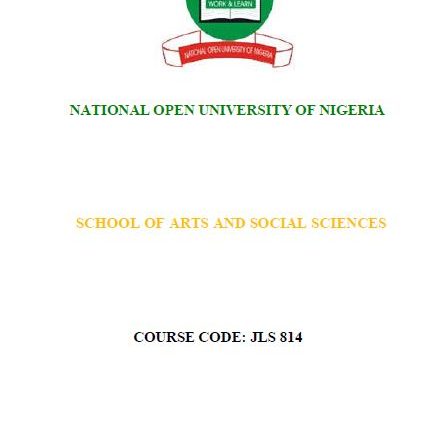Communication Research By National Open University of Nigeria in pdf format www.nou.edu.ng Module 1 Introduction Unit 1 The Meaning of Research and the Scientific Method Unit 2 Application of the Scientific Principles to Social Research Unit 3 Characteristics of and the Development of Mass Media Research Unit 4 Classification of Research Module 2 The Elements of Research Unit 1 Concepts, Constructs, Hypotheses/Research Questions and Instrumentation. Unit 2 Variables Unit 3 Measurement, Scales and Indexes Module 3 Major Communication Research Methods Unit 1 Experimental Research Unit 2 Survey Research Unit 3 Content Analysis Unit 4 Case study Unit 5 Observational Research Module 4 Sampling Unit 1 Meaning and Types of Sampling Unit 2 Population and Sample Unit 3 Sample Size and Sampling Error Module 5 The Research Procedure Unit 1 The Research Proposal Unit 2 Data Analysis in Communication Research Unit 3 Documentation in Communication Research Module 6 Areas of Mass […]
Ethics in Advertising Media & Self, Government and Media Regulations
Ethics in Advertising Lack of acceptable code of ethics in advertising is a worldwide phenomenon. Morality in advertising varies from country to country. An advertisement may be morally acceptable in one part of the world, whereas, it may be against the code of morality in another part of the world. Ethics in advertising is a complex issue to define. Nothing is good or bad but thinking makes it so. For example, sex before marriage in Pakistan is largely considered as immoral, while it is conceded as desirable in the west. Demonstration of birth control method in advertising is undesirable for the religious society in Pakistan whereas the same is mandatory in China. Thus morality in advertising is a complex phenomena. Determination of ethical conduct is subjective and vague and is varying among different cultures and different environmental conditions. The primary objective of advertising in any society is to influence the […]
Guidelines of precis writing
It was not so in Greece, where philosophers professed less, and undertook more. Parmenides pondered nebulously over the mystery of knowledge; but the pre-Socratics kept their eyes with fair consistency upon the firm earth, and sought to ferret out its secrets by observation and experience, rather than to create it by exuding dialectic; there were not many introverts among the Greeks. Picture Democritus, the Laughing Philosopher; would he not be perilous company for the desiccated scholastics who have made the disputes about the reality of the external world take the place of medieval discourses on the number of angles that could sit on the point of a pin? Picture Thales, who met the challenge that philosophers were numskulls by “cornering the market” and making a fortune in a year. Picture Anaxagoras, who did the work of Darwin for the Greeks and turned Pericles form a wire-pulling politician into a thinker […]
Differences between journalistic and literary writing
Journalistic writing Joseph Pulitzer, a famous publisher in the 1800s, stressed one of the most important qualities of journalistic writing in his memorable command: “ Accuracy! Accuracy! Accuracy!” Roger Mudd’s quote on the first slide refers to another important quality of journalistic writing: objectivity. In addition, all journalistic writing should be clear, concise and colorful. Nothing is more embarrassing or unprofessional than writing and publishing a story that has factual inaccuracies. As a reporter, we were responsible for the information printed in your story. Review everything carefully. Our reputation, and that of your publication, is at stake. Double-check the spellings of student, faculty, and staff names, as well as grade levels and titles. Refer to official documents listing this information, such as homeroom lists or a school directory. Keep a current phone book and an atlas handy to double-check the names of organizations and places. Double-check dates, using a calendar […]
Uses and Gratifications Approach
Uses and Gratifications One influential tradition in media research is referred to as ‘uses and gratifications’ (occasionally ‘needs and gratifications’). This approach focuses on why people use particular media rather than on content. In contrast to the concern of the ‘media effects’ tradition with ‘what media do to people’ (which assumes a homogeneous mass audience and a ‘hypodermic’ view of media), U & G can be seen as part of a broader trend amongst media researchers which is more concerned with ‘what people do with media’, allowing for a variety of responses and interpretations. However, some commentators have argued that gratifications could also be seen as effects: e.g. thrillers are likely to generate very similar responses amongst most viewers. And who could say that they never watch more TV than they had intended to? Watching TV helps to shape audience needs and expectations. U & G arose originally in the 1940s and underwent a revival […]
